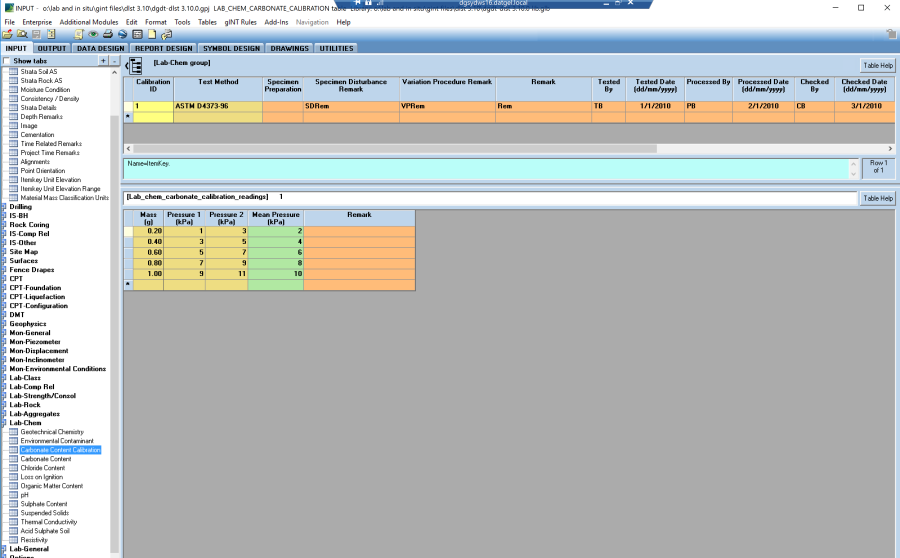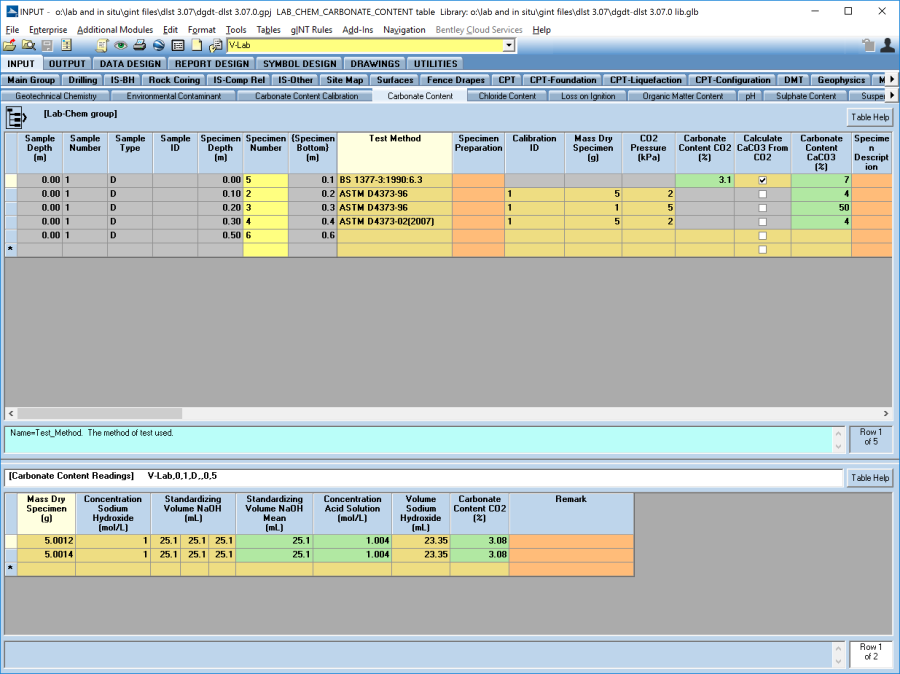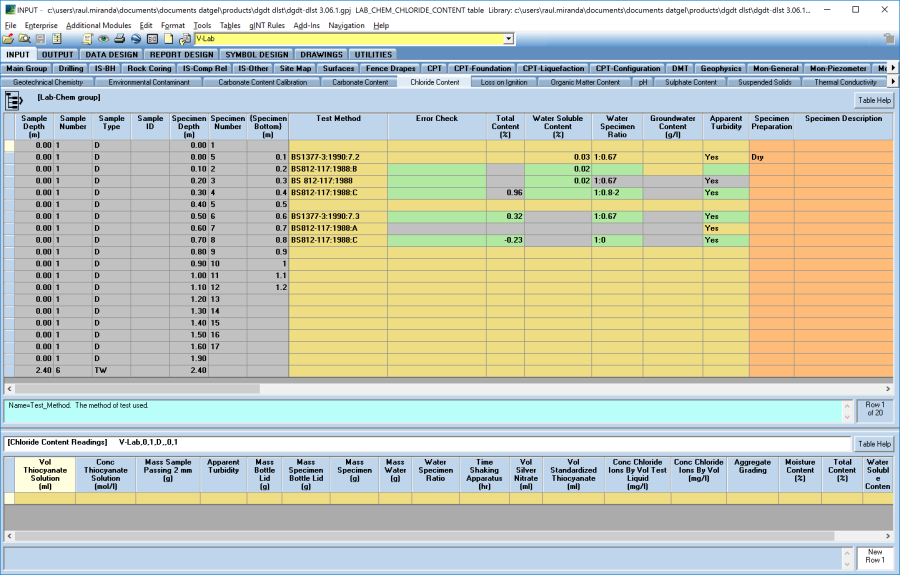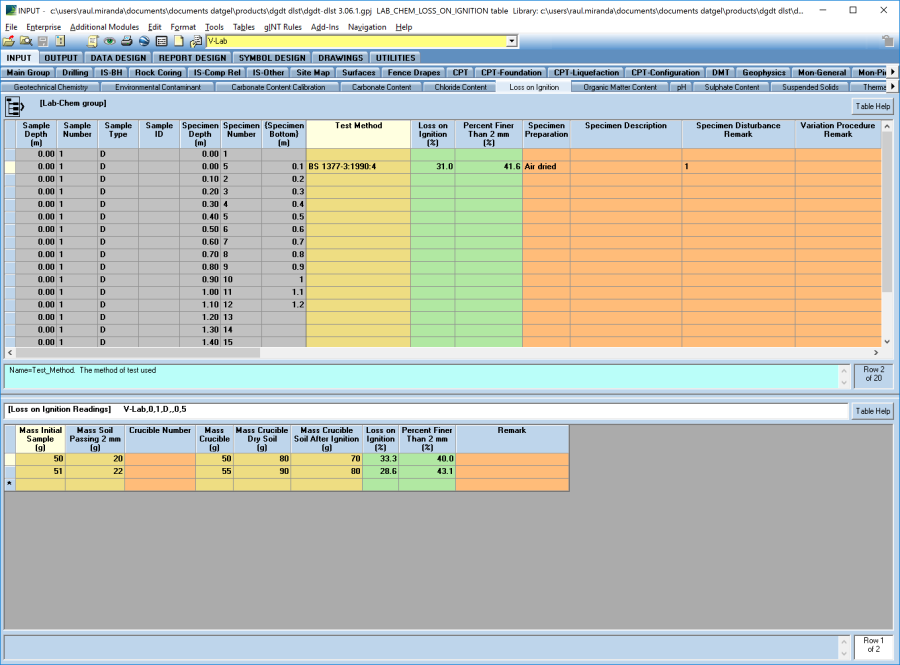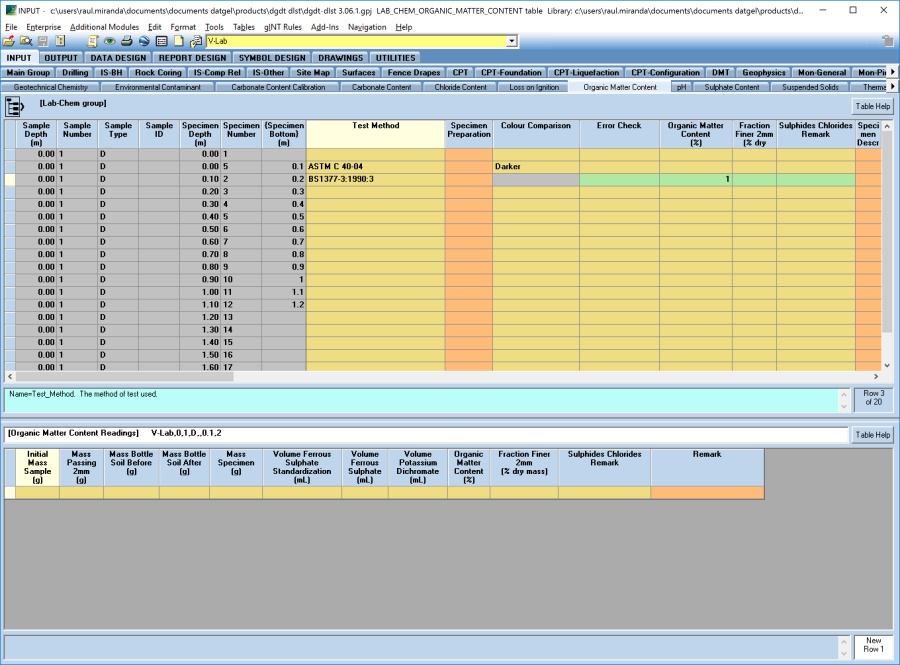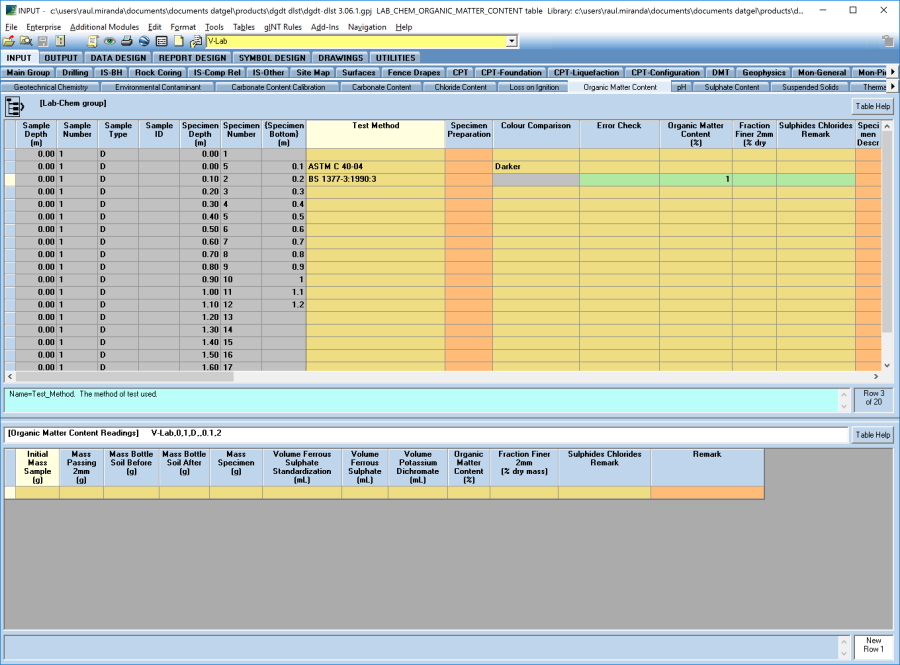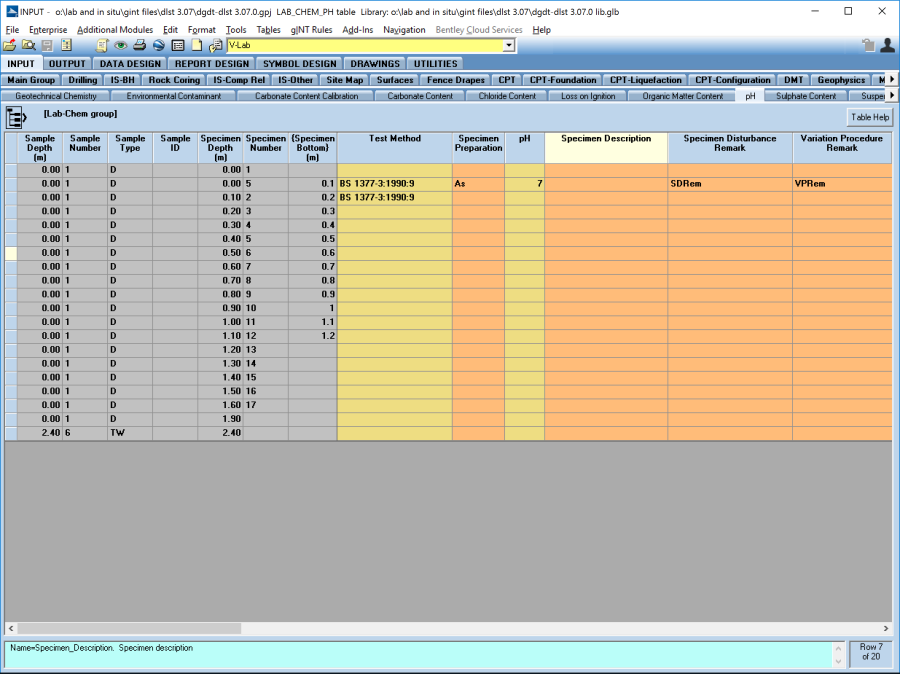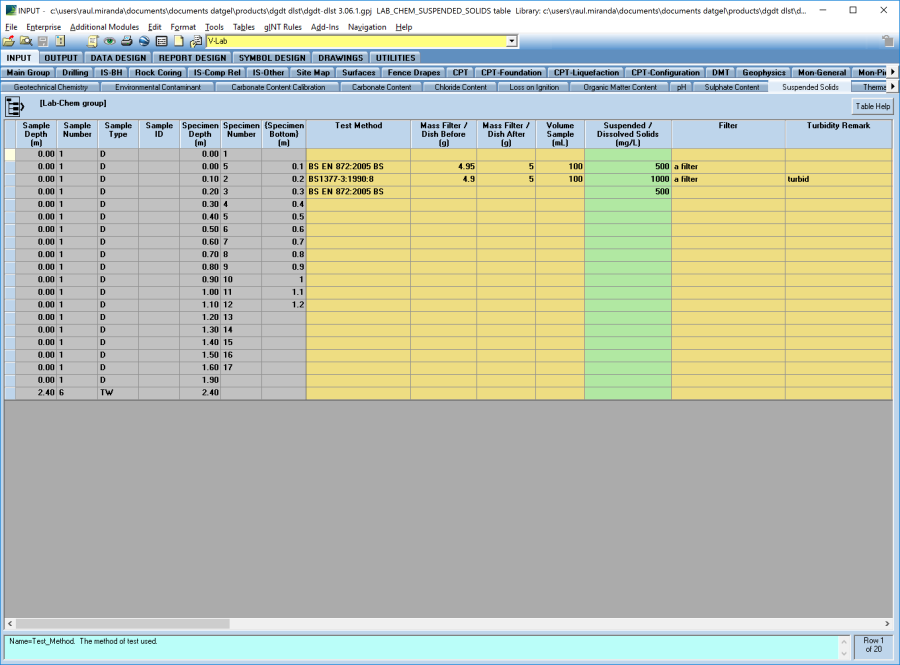Chemical Lab Testing
Carbonate Content
Carbonate Content Calibration
Lab-Chem | Carbonate Content Calibration
Complete the data entry fields and enter any other associated metadata as required. The value entered in the Calibration_ID field will then be used in the lookup list in the Calibration_ID field on the Carbonate_Content table.
Supported Test Methods
Standard | Description |
|---|---|
ASTM D 4373-02(2007) | Rapid determination of Carbonate Content of soils |
BS 1377-3:1990:6.3 | Determination of Carbonate Content – Rapid Tritation method |
Input
Lab-Chem | Carbonate Content
To calculate the Carbonate content of a specimen, you must first select the standard from the Test_Method field on the Carbonate_Content (upper) table that the specimen is being tested against. Once selected, click Save and the necessary data entry fields will be automatically highlighted to assist you in entering the relevant data in the Carbonate_Content (upper) and Carbonate_Content (lower) table for the selected test method.
Enter the test data in the data entry fields and click Save, Ctrl+S or change table to initiate the calculation. The values will be calculated automatically and the result will be displayed in the calculated fields.
The Carbonate Content (lower) table is related to the BS 1377-3:1990 6.3 Method and allows the user to introduce the test data. Otherwise, if ASTM Standard is selected, the calibration of the carbonate content apparatus must be entered in the Carbonate_Content_Calibration table.
Check the box Calculate_CaCO3_from_CO2 to calculate the Carbonate_Content_CaCO3 from Carbonate_Content CO2 Value when BS 1337-3:1990:6.3 Standard is selected.
Output
- Graphic Text Report | L CH CARBONATE CONTENT
Chloride Content
Supported Test Methods
Standard | Description | AGS Code | AGS Test Type | Units |
|---|---|---|---|---|
BS1377-3:1990:7.2 | Determination of water-soluble chloride content | CL | SOLID_21WAT | % Dry Mass |
BS1377-3:1990:7.3 | Determination of acid-soluble chloride content | CL | SOLID_TOT | % Dry Mass |
BS812-117:1988 | Determination of water-soluble chloride salts | CL | SOLID_11WAT | % Dry Mass |
BS812-117:1988:A | Qualitative test for the presence of chloride ions | CL | N/A | N/A |
BS812-117:1988:B | Field tests for the determination of chloride ions | CL | SOLID_WAT | % Dry Mass |
BS812-117:1988:C | Determination of chloride content using a nitric acid extract | CL | SOLID_TOT | % Dry Mass |
Input
Lab-Chem | Carbonate Content
To calculate the chloride content of a specimen, you must first select the standard from the Test_Method field on the Chloride_Content (upper) table that the specimen is being tested against. Once selected, the necessary data entry fields will be automatically highlighted to assist you in entering the relevant data in the Chloride_Content (lower) table for the selected test method.
Enter the test data in the data entry fields on the Chloride_Content (lower) table for each specimen and when you change table or select save, the values will be calculated automatically and the result will be displayed in the calculated fields.
The following examples show the required fields in the lower table for each selected standard.
Chloride Content – BS1377-3:1990:7.2
Chloride Content – BS1377-3:1990:7.3
Chloride Content – BS812-117:1988
Chloride Content – BS812-117:1988:B
Chloride Content – BS812-117:1988:C
Output
- Graphic Text Report | L CH CHLORIDE CONTENT
- Graphic Text Report | L CH CL AND SO3 CONTENT
Loss on Ignition
Supported Test Methods
Standard | Description |
|---|---|
BS 1377-3:1990:4 | Determination of the mass loss on ignition |
Input
Lab-Chem | Loss on Ignition
To calculate the mass loss on ignition content of a specimen, you must first select the standard from the Test_Method field on the Loss_on_Ignition (upper) table that the specimen is being tested against.
Enter the test data in the data entry fields on the Loss_in_Ignition (lower) table for each specimen and when you change table or select save, the values will be calculated automatically and the result will be displayed in the calculated fields.
Output
- Graphic Text Report | L CH LOSS ON IGNITION
Organic Matter Content
Input
Lab-Chem | Organic Matter Content
Simply enter the values into the required fields in the Organic_Matter_Content table. Data storage only, no calculations.
You must first select the standard from the Test_Method field on the Organic_Matter_Content table that the specimen is being tested against. Once selected, click Save and the necessary data entry fields will be automatically highlighted to assist you in entering the relevant data for the selected test method.
Output
- Graphic Text Report | L CH ORGANIC MATTER CONTENT
pH
Input
Lab-Chem | pH
Simply enter the values into the of pH and Test_Method fields in the pH table. Data storage only, no calculations.
Output
At the time of writing, there are no reports available for pH test.
Sulphate Content
Supported Test Methods
Standard | Description | AGS Code | AGS Test Type | Units |
|---|---|---|---|---|
BS1377-3:1990:5.2 & 5.5 | Acid-soluble sulphate content of soil – gravimetric method | SO3 | SOLID_TOT | % Dry Mass |
BS1377-3:1990:5.3 & 5.5 | Water-soluble sulphate content of soil – gravimetric method | SO3 | SOLID_21WAT | % Dry Mass & g/L |
BS1377-3:1990:5.3 & 5.6 | Water-soluble sulphate content of soil – ion exchange method | SO3 | SOLID_21WAT | % Dry Mass & g/L |
BS1377-3:1990:5.4 & 5.5 | Dissolved sulphate content of groundwater – gravimetric method | SO3 | WATER | g/L |
BS1377-3:1990:5.4 & 5.6 | Dissolved sulphate content of groundwater – ion exchange method | SO3 | WATER | g/L |
BS812-118:1988:5.5.2.1 | Determination of the sulphate in the extract - ion-exchange method | SO3 | SOLID_TOT | % Dry Mass |
BS812-118:1988:5.5.2.2 | Determination of the sulphate in the extract - gravimetric method | SO3 | SOLID_21WAT | g/L |
BS812-118:1988:6 | Determination of total sulphate by acid extraction | SO3 | SOLID_TOT | % Dry Mass |
BS812-118:1988:A Meth 1 | Semi-quantitative test for sulphate ions - test strips | SO3 | SOLID_TOT | % Dry Mass & ppm |
BS812-118:1988:A Meth 2 | Semi-quantitative test for sulphate ions - turbidity | SO3 | N/A | N/A |
Input
Lab-Chem | Sulphate Content
To calculate the chloride content of a specimen, you must first select the standard from the Test_Method field on the Sulphate_Content (upper) table that the specimen is being tested against. Once selected, the necessary data entry fields will be automatically highlighted to assist you in entering the relevant data in the Sulphate_Content (upper) table for the selected test method.
Enter the test data in the data entry fields on the Sulphate_Content (lower) table for each specimen and when you change table or select save, the values will be calculated automatically and the result will be displayed in the calculated fields. The following examples show the required fields in the lower table for each selected standard.
Sulphate Content – Input to BS1377-3:1990:5.2 & 5.5
Sulphate Content – Input to BS1377-3:1990:5.3 & 5.5
Sulphate Content – Input to BS1377-3:1990:5.3 & 5.6
Sulphate Content – Input to BS1377-3:1990:5.4 & 5.5
Sulphate Content – BS1377-3:1990:5.4 & 5.6
Sulphate Content – BS812-118:1988:5.5.2.1
Sulphate Content – BS812-118:1988:5.5.2.2
Sulphate Content – BS812-118:1988:6
Sulphate Content – BS812-118:1988:A Meth 1
Sulphate Content – BS812-118:1988:A Meth 2
Output
- Graphic Text Report | L CH SULPHATE CONTENT
- Graphic Text Report | L CH CL AND SO3 CONTENT
Suspended Solids
Supported Test Methods
Standard | Description |
|---|---|
BS EN 872:2005 BS 6068-2.54:2005 | Water quality – Determination of suspended solids – Method by filtration through glass fibre filters |
BS1377-3:1990:8 | Determination of total dissolved solids |
Input
Lab-Chem | Suspended Solids
Enter the test data in the data entry fields (Test_Method, Mass_Filter_/_Dish_Before, Mass_Filter_/_Dish_After and Volume_Sample) and click Save, Ctrl+S or change row to initiate the calculation. The values will be calculated automatically and the result will be displayed in the Suspended_/_Dissolved_Solids field.
Output
- Graphic Text Report | L CH SUSPENDED/DISSOLVED CONTENT
